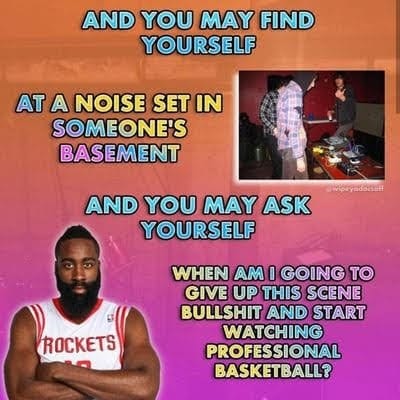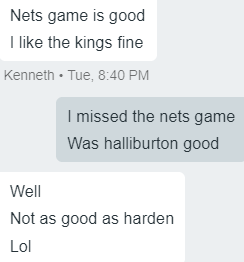This situation is crazy. It's something I don't think can be fixed.
Certainly the end of something or other, one would sort of have to think.

Note: This post has been edited since its original publication in March 2021.
In October 2012, Houston Rockets General Manager Daryl Morey completed a trade for reigning Sixth Man of the Year, Oklahoma City Thunder shooting guard James Harden. Fast-forward a year, and Dwight Howard was now on the team and citywide promises were made of a new age of Rockets basketball: at last, a referendum on the Yao/T-Mac years that ended in first-round exits, injuries, and flameouts that ranged from unfortunate to tragic. Spring 2014 solidified that team’s core and brought the re-emergence of Jeremy Lin alongside the gut-punch of .09, still the worst I’ve felt at the end of a sporting event. That summer, when they dumped Lin, missed out on Chris Bosh, and traded up-and-coming star Chandler Parsons (lol) for journeyman Trevor Ariza, it felt like a step back. Something happened, though: James Harden had his first of four MVP-caliber seasons.
There was nothing like zoning out on NBA basketball for six hours a night. I got League Pass and shoved a savant-level of minutiae into my brain, convincing myself if Terrence Jones could play like an all-star the Rockets could come out of the West and I could become the next Zach Lowe on groveling devotion alone. I lost all interest in movies and TV, and my social life was dominated by the NBA schedule. I had seldom felt more alive than when I watched a budding Bradley Beal blossom into a star or the time I watched the Warriors match up with the Rockets, both teams having begun the season with winning streaks, only to lose by 20; I thought then Oakland’s team might be the scariest I’d ever seen.
I was underpaid at my full-time(ish) job, I wasn’t committed more fully to freelancing, I had to drive across town to retain a social life that consisted of drinking five beers and checking scores on the NBA app. This was right before the “ain’t basketball crazy” goofball complex popped off, and I thought if I nose-dived into this world I could become a different person. It was a marker.
James Harden was my guy. He was stubborn but brilliant; undeniably gifted but shrunk in big moments; basked in the limelight when he was putting up MVP stats but shied away when things went sideways. To root for Harden was to root for a complex understanding of the game. In my obsession with the sport he was the perfect muse, a guy who hacked basketball defenses to take high-percentage free throw shots, launched threes with confidence, could drive to the basket on anyone, and made every single teammate better throughout the course of his six prime seasons in Houston. (He took Pablo Prigioni to meaningful minutes in a conference finals game seven.) His floor was a playoff lock and, aside from one season, 50 wins. His ceiling was a championship. To complain about flopping, the moment becoming too big for him, or to call him a ball hog, was to emboss a sign over your head that said “I am too stupid to understand his game, and therefore the game.”
He was a sharp but unexpected dresser; his Adidas shoes were innovative; he hung out with Sauce Walka, Meek Mill, and pre-murder Travis Scott; he sipped lean before playoff games (allegedly) to make everyone believe he was concussed; he (and Morey) were going to be the guys every year to give the Warriors a run for their money. It was an intoxicating rhythm. I keep seeing posts in my IG explore tab clearly made by people under 25 that say stuff like, “in 2016 the vibes in the NBA were perfect.” That was Harden’s worst year as a Rocket, but I found myself quietly, devastatingly nostalgic for 73-9, the 3-1 Finals comeback, the Gordon/Oladipo dunk contest, the games when Harden obviously showed up hungover. That was also the year my sister bought season tickets: so high off the Clippers comeback and improbable run to the conference finals in 2015 was she that she spent thousands to witness Michael Beasley become the second-best player on a 41-41 team. I dragged everyone who was my friend to a game that year.
Two years later Chris Paul’s hamstring prevented a championship and I saw “27 missed threes in a row” (but not really) alone in my new apartment on the longest weekend of 2018. It felt like the end of something, but also, potentially the start of something. We had the MVP, the sixth man of the year, the coach of the year, and who should have been the executive of the year. No reason to not run it back.
It’s impossible to add up all the text messages, DMs, and hours of IRL conversations about the NBA that dominated my social life during the years of 2014-2020. It was a pipe dream but I really did want to open an all-NBA bar and call it Three the Harden Way. Nothing else on TV, just League Pass and vibes. I spent too much money at the team store buying swagless Adidas shirts that didn’t fit right and the collars would always stretch out. I had four pairs of Harden 1s. Every time I was paid to write about sports or talk to athletes felt great.
The initial shock and disappointment of Harden's trade request subsided to a dim ember of general indifference—I picked up Billy Lynn’s Long Halftime Walk and on every page is a cutting observation about the insidious ways professional sports gets turned into a prism for patriotism and war and how these ideologies wreck the lives of young men. I tuned into the only game of football I watched all season on Super Bowl Sunday to see Tom Brady win another ring. Who cares?
At the risk of triteness, the Harden trade is like a breakup; it’s sad, sure, but I don’t wish him any ill will. It’s a chance to make peace. That time in my life meant a lot to me as it was happening and now it’s over. He can be the third option while averaging career-lows in all major statistics on a team that doesn’t have any real fans and won’t go far in the playoffs playing historically awful defense to say nothing about the lingering injury concerns regarding KD and Kyrie—great, I’m happy for him. I really am. Believe me.
LeBron on the Lakers is a business decision, not a basketball one: he might as well wear an “NBA” jersey. That he and Brady won championships to cap off miserable and insane 2020 seasons is fitting. Business decisions kept both sports in action during a pandemic and business decisions decided the outcomes. A basketball decision is Kevin Durant leaving OKC at his peak to be the crown jewel of the greatest professional basketball team ever assembled; Harden in Brooklyn is a business decision. The Brooklyn Nets’ general existence is a business decision, a real estate deal fashioned by suits at the start of the previous decade to create a landing site for aging stars without a home. I have no qualms with people wanting to reach the pinnacle of their chosen profession. But it feels different in 2021—we’ve spent a year dissecting every way modern American life has failed us and now we’re making individual business decisions to extract the last doses of pleasure before the 21st century’s decline. People are corporations.

My virgin pandemic experience ended against the backdrop of a dramatic, unexpected decline in infections nationwide. I tested positive the day after Dani and remained asymptomatic until I lost my sense of smell mid-shower. I picked up groceries curbside for two weeks before Texas froze; deregulation and the gutting of oversight resulted in a statewide death count of 80 (and counting). [2024 update: probably more in the neighborhood of 700. Abbott is seeing hell.] Amidst this month’s tumult, Harden has once again assured me he’s still my guy: KD’s prolonged absence from the Nets has Harden looking like Houston Harden; last week he said he’d been on the phone trying to figure out a way to help the city; and after admitting he didn’t like the way his Rockets tenure ended, it was comforting to know he still loves the people of Houston. I will always love what the game meant to me when James had the city on his back.